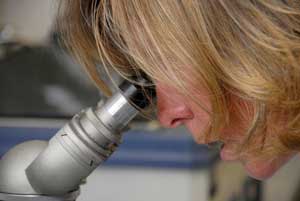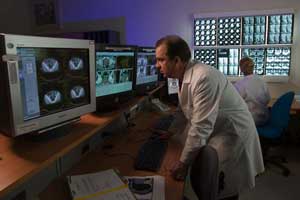Oncologist
Tasks & duties

Oncologists may do some or all of the following:
-
talk to patients about their symptoms and illnesses
-
examine patients
-
request appropriate tests and study the results
-
study x-rays or other radiographic images and medical reports
-
confirm the diagnosis in consultation with other medical professionals
-
discuss various treatment options with patients and their families, and explain the potential benefits, side effects and outcomes
-
determine how to manage the patient's illness
-
determine if treatment is appropriate, and what treatment is best
-
treat the patient
-
monitor, support and care for patients during and after their treatment
-
write reports on the treatment of patients for general practitioners and other medical specialists
-
teach trainee oncologists
Specialisations
Gynaecological Oncologist
Gynaecological oncologists specialise in cancers of the female reproductive system.
Haematologist
Haematologists have expertise in blood diseases including cancers such as leukaemia and myeloma.
Medical Oncologist
Medical oncologists specialise in drug treatments of cancers.
Paediatric Oncologist
Paediatric oncologists deal with cancers in children, which are often quite different from those that occur in adults.
Radiation Oncologist
Radiation oncologists treat patients using various types of radiation.
Surgical Oncologist
Surgical oncologists specialise in operating on people with cancer.
Skills & knowledge

Oncologists need to have:
-
communication and people skills to relate well to patients and colleagues
-
knowledge of cancer and how to treat it
-
knowledge of anatomy and how the human body works
-
knowledge of different diseases and illnesses
-
knowledge of medicines and treatments, and the effect these have on patients
-
an awareness and understanding of other cultures and their attitudes to medical treatment
-
diagnostic skills
-
analytical and interpreting skills
-
decision-making and problem-solving skills
-
organisational and time management skills
-
report writing skills
-
up-to-date knowledge of new research, treatments and practices
-
knowledge of medical ethics and law
Entry requirements
To become an oncologist you need to complete a Bachelor of Medicine and Bachelor of Surgery (MBChB). You must then spend two years as a house surgeon in a hospital and another six years in specialist training.
The University of Auckland and the University of Otago are the only two providers of the MBChB degree in New Zealand.
Secondary education
A tertiary entrance qualification is required to enter further training. Useful subjects include Bursary or NCEA equivalent maths, chemistry, physics, biology and English.
Tertiary education
To enter the MBChB you need to complete the first year of a Bachelor of Health Science or a Bachelor of Science (Biomedical). Your first-year final grade is also determined by non-academic achievements including the Undergraduate Medicine and Health (UMAT) admission test and/or interview.
Alternatively, you can complete a related health sciences degree and apply for graduate entry to the MBChB programme. Graduate applicants must also take the UMAT admission test.
Training on the job
Oncologists are required to regularly attend conferences and seminars to keep up to date with new research and techniques. It is also expected that oncologists will spend time working overseas to broaden their skills and experience.
Registration
Oncologists need to be registered with the Medical Council of New Zealand.
Useful experience
Useful experience for oncologists includes any work in the medical profession such as nursing, hospital work or work as a general practitioner. Experience working in a cancer centre overseas has for some time been seen as a prerequisite for working as an oncologist in New Zealand.
Related courses
Internal Medicine
Medical Science
Surgery
For more information, please refer to Career Services.
Document Actions
